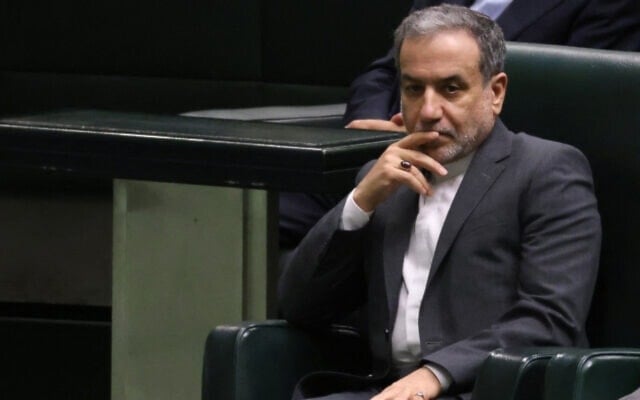Iran-US communication channels remain open: Araghchi
Iran’s Foreign Minister has acknowledged that the deep-seated issues between Washington and Tehran are unlikely to be resolved soon.
-

Abbas Araghchi attends a parliament session in the capital Tehran, on August 17, 2024, as Iran's President defends his cabinet selection. (AFP)
Iran's Foreign Minister Abbas Araghchi confirmed that despite the deep-seated differences between Iran and the United States, communication channels between the two countries remain open.
Araghchi highlighted that these fundamental disagreements are unlikely to be resolved in the near future but emphasized the importance of managing the tensions to minimize costs and avoid escalation.
"We need to manage them to reduce the costs and tensions," he asserted.
Elsewhere in his remarks, the top Iranian official praised the recent meeting of the Organization of Islamic Cooperation (OIC), calling it "a very good meeting" where the heads of state voiced strong, unified positions.
Araghchi emphasized that a decisive decision was taken during the meeting, with the final resolution consisting of 38 clauses. The decision was marked by a particularly strong condemnation of the Israeli regime, denouncing its actions in various regions. According to Araghchi, the tone of the resolution was unmistakably firm in its opposition to the Israeli policies and actions.
The top Iranian official also addressed the upcoming visit of Rafael Grossi, the Director General of the International Atomic Energy Agency (IAEA), noting that while there have been challenges in their cooperation, Iran and the UN nuclear agency have a long-standing working relationship.
He expressed optimism that Grossi's visit would lead to an agreement on some key issues, mentioning that the UN nuclear chief has a "positive morale" heading into the talks.
Earlier today, Araghchi cautioned the United States that any renewed "maximum pressure" policy would lead to failure, urging Washington to consider a strategy of "maximum wisdom" instead.
In a series of posts on his X account, Araghchi argued that the initial phase of maximum pressure on Iran had ended in a significant setback for the US.
"The second version of maximum pressure will lead to the second version of maximum failure for the United States," he stated.
"Maximum Pressure 1.0 compelled Maximum Resistance and ended in Maximum Defeat for the US. The proof? One example: just compare Iran's peaceful nuclear program before and after the so-called 'Maximum Pressure' policy," the top Iranian diplomat wrote.
Araghchi’s comments refer to the US sanctions and diplomatic isolation measures applied under previous American administrations, which he stressed had spurred resilience rather than compliance within Iran.
Emphasizing the need for a more constructive approach, he suggested that the US adopt "maximum wisdom" as a diplomatic alternative.
"Attempting 'Maximum Pressure 2.0' will only result in 'Maximum Defeat 2.0'," Araghchi warned, adding, "Better idea: try 'Maximum Wisdom'—for the benefit of all."
IAEA chief to visit Iran on Wednesday amid regional nuclear concerns
The Director General of the International Atomic Energy Agency, Rafael Grossi, has scheduled a visit to Tehran, Iran, starting Wednesday, Iranian news outlet Mehr reported on Sunday.
In a recent post on X, Grossi signaled that a "timely and substantive exchange" with Iran’s Deputy Foreign Minister Kazem Gharibabadi was made ahead of his visit.
Grossi is expected to hold talks with high-ranking Iranian officials amid the volatile state the region has been forced into as "Israel" continues expanding its aggression and threatening to attack Iran's nuclear infrastructure.
Iran has previously mentioned that any existential threat posed against its sovereignty would trigger a shift in its nuclear policy.
The head of Iran's Strategic Council on Foreign Relations Dr. Kamal Kharrazi asserted, in an exclusive interview for Al Mayadeen, that Iran has the technical capabilities to produce nuclear weapons and encounters no significant obstacles in this regard. However, he emphasized that the Fatwa issued by Iranian Leader Sayyed Ali Khamenei serves as the sole constraint preventing Iran from pursuing nuclear armament.
Kharrazi articulated Iran's stance on regional tensions, emphasizing the nation’s preparedness to respond to any escalation while expressing a desire to avoid further escalations.
He highlighted Iran's military capabilities and the potential for changes in its nuclear policy in response to perceived "existential threats", framing the discussion within the broader context of Iran’s geopolitical stance and its commitment to national sovereignty.
Read more: Iran not after nuclear weapons, trust not one-way street: Aragchi

 4 Min Read
4 Min Read








